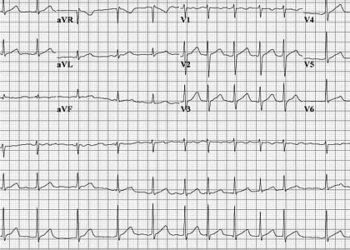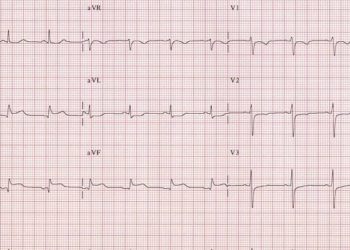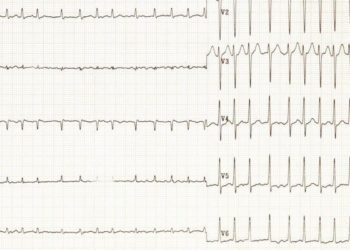Cardiac MRI predicts degree of heart dysfunction after STEMI
1. Using cardiac magnetic resonance imaging (MRI), an association was found between infarct severity in patients with reperfused ST segment elevation myocardial infarction (STEMI) and poorer functional recovery of the left ventricle (LV).
2. Cardiac biomarker assessment showed that the presence of microvascular obstruction (MVO) and intramyocardial hemorrhage (IMH) after STEMI reperfusion adversely influenced the magnitude of irreversible myocardial damage and postinfarction regional and global LV remodeling.
Evidence Rating Level: 2 (Good)
Study Rundown: When cardiac blood supply is blocked for a prolonged period such as in STEMI, reperfusion therapy with early percutaneous coronary intervention (PCI) may salvage myocardial tissue and reduce mortality. However, restoration of arterial blood flow after prolonged occlusion does not always lead to adequate reperfusion at the microvascular level, and complications such as microvascular obstruction (MVO) and intramyocardial hemorrhage (IMH) may arise. In this study, cardiac MRI was used to examine the relationship between infarct severity (as indicated by presence of MVO and IMH) and regional and global postinfarction LV remodeling and dysfunction. Reperfused STEMI patients were prospectively studied the first week and 4 months after infarction and compared to age-matched controls. Results of the study indicate that increasing myocardial infarction severity is associated with reduced postinfarction LV remodeling and lack of functional recovery, both regionally and globally. The relationship between infarct severity and postinfarction LV dysfunction allows for potential therapeutic interventions to prevent reperfusion injury and improve clinical outcomes in patients with STEMI treated with PCI. The study was limited in that the images were only evaluated by one observer, which might limit the generalizability of the findings.
Click to read the study in Radiology
Relevant Reading: Detection of acute reperfusion myocardial hemorrhage with cardiac MR imaging: T2 versus T2
In-Depth [prospective cohort]: 186 patients (mean age 59 years ± 11) with a diagnosis of STEMI treated with early PCI were prospectively enrolled between from December 2007 to July 2012. For each study participant, infarct severity, MVO, IMH, and LV remodeling were assessed by cardiac magnetic resonance and cardiac biomarkers (Troponin I) at one week and four months post-infarction. Patients were divided into three infarct severity groups according to the presence or absence of MVO and IMH and compared with 40 control subjects (58 years ± 10). Infarct severity was significantly correlated (P < .001) with cardiac biomarkers, and significantly inversely correlated with degree of myocardial salvage following infarction. At four months follow-up, ventricular remodeling and functional assessment showed LV ejection fraction was significantly improved among those study participants with less infarct severity following PCI. Moreover, the results suggest that post-infarction LV dysfunction affects the myocardium globally at sites distant to the infarcted territory, and that worsening infarct severity is positively correlated with more severe global LV dysfunction and four months and progression toward congestive heart failure.
More from this author: Ultrasound useful for risk stratification after nondiagnostic thyroid biopsy, Mammography linked to improved breast cancer outcomes among women 75 and older, Regional central nervous damage associated with fatigue in multiple sclerosis, Diffusion-weighted MRI sensitive for metastasis in pelvic lymph nodes
Image: PD
©2012-2014 2minutemedicine.com. All rights reserved. No works may be reproduced without expressed written consent from 2minutemedicine.com. Disclaimer: We present factual information directly from peer reviewed medical journals. No post should be construed as medical advice and is not intended as such by the authors, editors, staff or by 2minutemedicine.com. PLEASE SEE A HEALTHCARE PROVIDER IN YOUR AREA IF YOU SEEK MEDICAL ADVICE OF ANY SORT.






![Aggressive blood pressure control may be beneficial for intracerebral hemorrhage [INTERACT2]](https://www.2minutemedicine.com/wp-content/uploads/2013/05/Mri041b21-e1411093069407-75x75.jpg)


